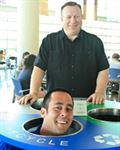
 UC Merced’s library used to be one of the trashiest places on campus – patrons generated a lot more garbage than recycling.
UC Merced’s library used to be one of the trashiest places on campus – patrons generated a lot more garbage than recycling.
But all that garbage led to an invention by two campus staff members that could help UC Merced reach the zero landfill waste portion of its Triple Zero commitment. The goal also includes having zero net energy and climate neutrality by 2020.
Eric Scott, associate university librarian for library operations, and Matt Hirota, the campus waste reduction/recycling coordinator, designed a three-section bin for recyclables, compostable material and landfill items.
Three stand in The Lantern, where students, faculty and staff use them every day.
And if Scott and Hirota have their way, not only will the invention be patented, it will be found in many other locations beyond UC Merced, too.
The idea came about because the library staff learned about the amount of recyclable waste being disposed of in the library. The numbers dismayed Scott, a dedicated recycler. The library got new recycling bins and Scott worked with campus custodial services to place them strategically so they’d be easy to see and access.
But the new bins also got Scott and Hirota thinking about something more efficient for different areas.
“We had a mish-mash of containers here in The Lantern,” Scott said.
Hirota started looking the different styles of recycling bins and thinking about what would work best in The Lantern space.
“We wanted it to be free standing, accessible on all sides, lightweight, ergonomic, easy to clean,” he said.
He and Scott decided to design their own – one that would fit with its surroundings. There are round columns and round tables in The Lantern, so they designed a round, three-section bin and took their design to local manufacturer Great Spaces for construction.
Great Spaces helped refine the design, Hirota said, and even added hospital-gurney-style wheels that seal on the bottom so they cannot get clogged and stopped by trapped dirt.
The wheels elevated the bins just enough so they can be seen even by people sitting at tables in The Lantern.
Though one section is for landfill-bound items, Hirota and Scott hope those sections get less and less use as more items become recyclable or compostable.
Some items, like potato-chip bags, some of the plastic cups and Styrofoam pieces are still destined for the landfill, not being fully recyclable yet. They hope The Lantern Café switches to all recyclable and compostable materials, and said they will orchestrate an educational campaign about the bins around that change.
The recycling sections on each bin get the most use, they said, and there’s still a little confusion over what’s compostable. They put signs atop the bins explaining that food and napkins go in the compost section.
But they are in the process of showing people how to use the bins, taking them to Staff Appreciation Day and student orientation events and posting staff members with the bins to tell people about them.
The bins can be made from a variety of materials, and could be good for any large open space where many people gather, from cafeterias, hospitals and hotels to convention centers, airports and sporting events.
UC Merced recently applied for a U.S. design patent on the “Round Multi-Section Recycling Bins,” but the patent process can take years.
Other UC campuses and area school districts and have also expressed interest, and the bins could be scaled down for children and used as part of an environmental education unit, said David Cepoi, the intellectual property and licensing manager for UC Merced’s Office of Research.
“This shows that anyone on our campus can make a difference,” Cepoi said. “We take everyone’s ideas seriously.”
Hirota said the bins are just part of a changing culture.
“People think more now about sustainability,” he said, “and our campus is helping lead the way.”
The bins – and all the campus’ sustainable practices are creating a legacy, Scott said.
“People come here and get used to sustainable behavior,” he said, “and they take those practices out into the world.”
To see a video about the bins, visit http://www.youtube.com/watch?v=qmROa9jRlAw.
Lorena Anderson

Senior Writer and Public Information Representative
Office: (209) 228-4406
Mobile: (209) 201-6255






